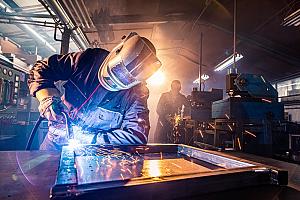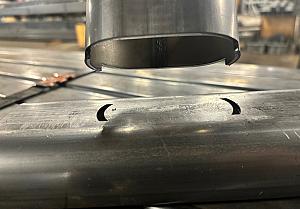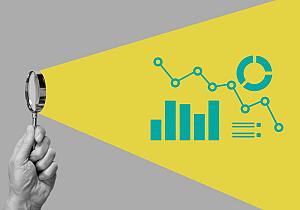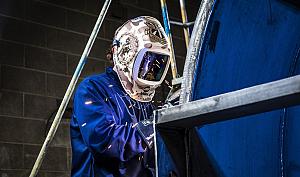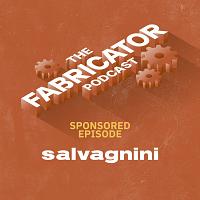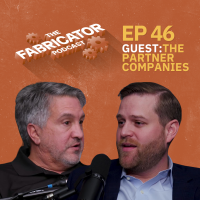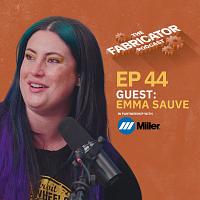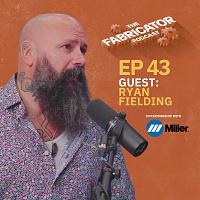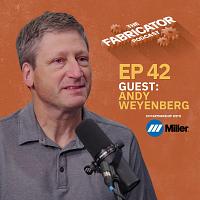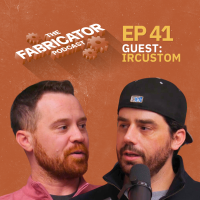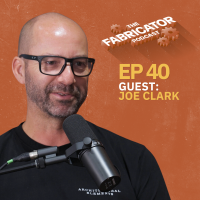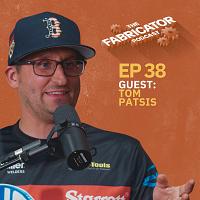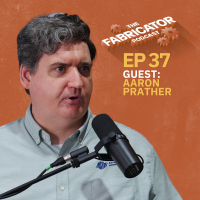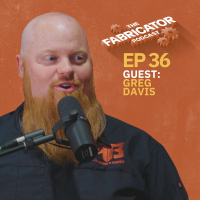Developing a one-stop fabrication shop through community and automation
Cameron Adams of Laser Precision, a contract metal fabricator in the Chicago area, joins the podcast to talk about how the family-run business has grown from a small 6,000-sq.-ft. shop to a 130,000-sq.-ft facility that serves large OEMs in the heavy equipment industry.
Adams describes Laser Precision as a one-stop shop by providing end-to-end processes with laser cutting, CNC machining, welding, press brake forming, and powder coating.
He also discusses Laser Precision's recent acquisition by Weller Metalworks, its plans for future growth, and the trend of mergers and acquisitions in metal manufacturing.
He explains that many OEMs are looking to consolidate their supplier base and work with a select few trusted suppliers, and how Laser Precision works to be on that shortlist.
Adams also discusses the company's focus on workforce development and its efforts to attract and train skilled employees. He emphasizes the importance of raising awareness about the manufacturing industry and the opportunities it offers.
Adams also mentions the potential for AI and automation in the industry, particularly in areas such as scheduling and quoting, as well as the importance of near-shoring supply chains.
At the top, the guys discuss Nuts, Bolts, & Thingamajigs summer manufacturing camps and Back to the Future.
This episode is brought to you by MC Machinery Systems, a subsidiary of Mitsubishi Corporation.
Email us at podcast@fmamfg.org with any comments, questions, or suggestions.
In This Episode
Learn more about MC Machinery Systems
Learn more about FABTECH Canada
Learn more about Laser Precision
Learn more about Weller Metalworks
Learn more about podcast sponsorship opportunities.
TRANSCRIPT
Cameron Adams: These large OEMs don't have these dedicated purchasing groups that have enough people to manage thousands and thousands and thousands and thousands suppliers that do the same thing. And so what I think we're seeing is they want to find 15, 20 really, really good suppliers and work with them and kind of consolidate the spend on those companies. And what we're trying to do, we're just trying to be on that short list.
Sara Spring: This episode of The Fabricator Podcast is brought to you by MC Machinery Systems, the US-based supplier and servicer of Mitsubishi lasers, press brakes, and automation equipment. A subsidiary of the Mitsubishi Corporation, MC Machinery's expertise spans virtually every aspect of metalworking from simple fabrication to CNC driven automated cells. MC Machinery has technology centers with service and support teams located across North America. Go to mcmachinery.com to learn more.
Dan Davis: Hello, I'm Dan Davis. This is The Fabricator Podcast. This is...
Lincoln Brunner: Lincoln Brunner of The Tube and Pipe Journal, and sometimes The Fabricator,
Dan Davis: Sometimes The Fabricator. And today we're speaking with Cameron Adams of Laser Precision, a job shop out of Libertyville, Illinois. And we're speaking with them because they're a customer of Mitsubishi Laser, MC machinery. Laser Precision uses MC machinery, Mitsubishi Laser's equipment in their everyday operations. And we had a nice conversation about what they're up to, their growth and workforce development. With that in mind, we want to talk about NBT. No one said fight.
Gareth Sleger: Oh, fight.
Dan Davis: That's all right.
Gareth Sleger: Fight. I took a sip of water. No one said fight. That's all right.
Dan Davis: Nuts, bolts and thingamajigs. It's that time of year. Yes, it's time to get America's future familiar with manufacturing. Luckily for you, we have established a network of manufacturing camps where, no, they'll not be worked, but they'll be exposed to the skills and excitement of manufacturing. This is an example of what they might build at one of these camps.
Lincoln Brunner: Yeah. This metal fabricated, not storefront, building.
Dan Davis: Yes. Which I'm told looks like the courthouse from Back to the Future. Yeah. Hill Valley Courthouse. Yes.
Lincoln Brunner: It's a reasonable facsimile.
Dan Davis: Yeah. And odds are, you might run into a Doc Brown at one of these manufacturing camps. We can't guarantee it. There's some very intelligent and talented people at these camps.
Lincoln Brunner: The likelihood is high
Dan Davis: May work on a DeLorean, and there's no guarantee that they can turn back time. But if anyone can, odds are they'll be at one of these summer camps. Perhaps your child will be responsible.
Lincoln Brunner: You don't want to necessarily have us teenagers going 88 miles an hour through the parking lot, but...
Dan Davis: But they could end up in 1860.
Lincoln Brunner: That's true.
Dan Davis: See, one more reason. When we talk about exciting careers in metal fabricating, time travel is rarely broached, but I think it's important that we say say anything's possible.
Lincoln Brunner: We can go there.
Dan Davis: Broaden your mind. Turn back time.
Gareth Sleger: Yeah. Learn how to weld. Learn how to program a robot and learn how to build a time machine.
Dan Davis: There you go. But they could have make friends with, what do you call this thing? The quantum physicist in your business. That's two rhymes.
Gareth Sleger: That's pretty good.
Lincoln Brunner: Not bad.
Dan Davis: Yeah. I almost called them a network, makes it sound like some kind of multi-level marketing scam. Nuts, Bolts & Thingamajigs been around several years. Locations all across this country throughout the summer.
Gareth Sleger: How many are we looking at?
Dan Davis: More than two hundred I've been told from the website. I think last year, I don't know, it was a record number. People want to know. People understand that having skills is a good thing. The world needs to be made, not just read about.
Gareth Sleger: Yeah. If you go to the NBT website landing page, you can see the map of all the camps. So it's pretty easy to-
Dan Davis: fmamfg.org and click on the foundation header at the top, and you'll get all the information you need. And these camps, we hold them all the way from California to the West Coast, all through the Midwest down south. Not too many in the Plains states, but we're working on that.
Gareth Sleger: One in Wyoming.
Dan Davis: We do have one in Wyoming. That's impressive. Imagine and Create camp June 10th through June 14.
Gareth Sleger: So there's still time to sign up for that.
Dan Davis: Remember, learn more about NBT. If you don't have anyone interested in attending, please consider donating. It's a good investment in the future of manufacturing and metal fabricating in North America. And enjoy this episode with Cam Adams, Laser Precision. And thank you to Mitsubishi Laser MC machinery for sponsoring this.
Sara Spring: The Mitsubishi GXF Advanced series of 2D fiber lasers features the latest in AI and new patented gas reduction technology, delivering more power while using less nitrogen and requiring less operator intervention. Designed by Mitsubishi engineers and built with major Mitsubishi components, the GXF Advanced series is one of the only laser systems in the industry with a single source for service and support. Go to mcmachinery.com to learn more. Explore the innovation shaping Canada's manufacturing future at Fabtech Canada, June 11th through the 13th at the Toronto Congress Center. Meet face-to-face with more than two hundred world-class suppliers. Discover the latest products and find tools that improve productivity. Fabtech Canada 2024, where manufacturing innovation shaped the future for Canadian manufacturers. Register for free today at fabtechcanada.com. And now back to the episode.
Dan Davis: This episode is brought to you by our friends at Mitsubishi Laser. Thank you for sponsoring this and this conversation with Cam Adams of Laser Precision in Libertyville. Thanks for joining us.
Cameron Adams: Yeah, thanks for having me. I appreciate it.
Dan Davis: You are a user of Mitsubishi Technology, and we'll get into that a little bit later. Laser Precision out of Libertyville, Illinois. So kind of a local player in a metal fabricating scene in Illinois, but customers all over the place. Can you give us an idea about Laser Precision, their capabilities or its capabilities and maybe customer base?
Cameron Adams: Yes, sure. So Laser Precision, contract metal fabricator. My dad started the business in 1994. In a previous life, he actually was an employee of MC Machinery Mitsubishi.
Dan Davis: Oh wow. Okay.
Cameron Adams: Yeah. So that's kind of how he cut his teeth in the industry. And at a certain point, I think he decided he wanted to start a laser business, was fortunate enough to be able to partner with Mits and they helped him finance his first machine. Started in a really small, I think six thousand square foot warehouse in Mundelein. And today we are obviously headquartered in Libertyville. We have 130,000 square feet of manufacturing space. So primary operations we do are laser cutting, CNC machining, welding, cobot welding, which is something that we've really gotten into in the past couple of years, press brake forming. And then we also do powder coating out of our Libertyville facility as well.
Lincoln Brunner: All in that 130,000 square feet. Wow.
Cameron Adams: Yeah. We try to be a one-stop shop. So we can cut it, bend it, weld it, paint it, and ultimately ship it to our end customer. We're pretty heavy into the heavy equipment and mining industry, and primarily the majority of our customers are large OEMs. So a very good chance that if you see heavy equipment and infrastructure projects or anything like that, our parts are being used on those pieces of equipment.
Dan Davis: And you're sending them all over the place.
Cameron Adams: Yeah. So it's kind of interesting because you hear that there's all these low cost countries that some of these large companies are sourcing work out to. In some cases it makes a lot of sense, but we actually send stuff to China, Brazil, Mexico, India, and the only rationale that I've been able to come up with is basically that really at the end of the day, I think what these companies are looking for more than anything is assurance of supply. And kind of a way that we've put it to some of our customers is that you may be able to buy a bracket or a hose clamp or something like that for half the cost in one of these low labor cost countries, but when it doesn't show up when you need it or it's wrong or something, there's a cost there too. So we really focus on trying to present the total cost of ownership to our customers, and we have very specific KPI targets that we work off of. So on-time shipping performance, parts per million defect rate, and really kind of looking at those really taken as a whole, we feel like we're very competitive on our cost and everything like that. But at the end of the day, if you can't ship your parts to a production line when they need them, it doesn't do you much good.
Dan Davis: Were you sending product all over the world before the pandemic, or was that?
Cameron Adams: Yeah.
Dan Davis: Oh wow.
Cameron Adams: Yeah.
Dan Davis: Before supply chains collapsed?
Cameron Adams: Yeah. Yeah. And I think that's a whole nother thing that we're going to really start to see here in the next... Even now we're seeing it a lot of near shoring, and I think large integrated manufacturers are really looking to really try and drive assurance of supply. And obviously one way you can do that is to localize your supply chains around where you're actually building your product.
Lincoln Brunner: When you say near shoring, what is the total geographic area you're thinking about when you say that? Is it just the US? Is it North America? What is it to you?
Cameron Adams: I think it depends. I mean, it depends the industry you're serving, but I would say my definition of it is North America but it's hard to say. It really depends on the customer, where they're building the product, that's a big driver of it. Obviously with trucking shortages and all that stuff, that's a major consideration as well. I would say that there's really been a movement for some of our customers to really try and have the products they purchase, or parts I should say that we produce, within a certain radius of where they're actually building the end product. Or if they're not, they got to have a good justification as to why they do it. So for us, the justification is typically these guys deliver almost a hundred percent on time. Their parts are very seldom wrong, so there's a benefit to them for that.
Lincoln Brunner: Well, and so you've built up a really good reputation for reliability, on time delivery, and that can work in your favor when the logistics don't quite work out exactly the way we want. I am interested in that in serving so many different plants in so many different countries, how does that work for you logistically? I mean, is that a big part of your operation, is just keeping track of all that?
Cameron Adams: Yeah, so another value add service we do basically is logistics management. So we actually, if they're parts are going overseas we'll do all the dunnage for that. We'll basically get the parts ready to go. If they're going on an ocean container or something like that, we'll do all that. And then basically we are tasked with loading out manifests every single day. So we're going out and basically booking four days in advance, so we got to know what's going to be on the truck, and we're doing nose to tail end load out of what we're going to be putting on the truck. So there's definitely a lot of things just outside of the fabrication that we do that has to be a critical part of our business. And one way that we are able to manage all that is that we've built and partnered with a local ERP company that's really helped us kind of develop some custom platforms. And I would argue that fabricators that are going to continue to be successful and scale their businesses have to have a strong ERP system in place to be able to manage all the data that's coming in from these large OEMs.
Dan Davis: So we wrote about laser precision in the pages of The Fabricator, at least our co-worker, Tim Heston, did, shout out to Stone Mountain, Georgia, his point in the article was that laser precision is kind of in the information business, and his point was that ERP was useful. And dealing with as many SKUs as laser precision does, I mean, it's almost a necessity.
Cameron Adams: You have to. This is a little before my time, I think 2003, 2004, we were drowning and the daily changes that were coming over from our customers, and you got to manage all that. And we basically said, there's got to be a better way to do this. So we partnered with a local ERP company and really sought out to kind of develop a system that would allow us to take basically daily downloads via EDI, electronic data interchange, which is what a lot of these OEMs are using to transmit their schedules and things like that, and basically have it be able to be transacted in our ERP system so that human interaction with it was very minimal and ultimately drive that out to the shop floor in the form of prioritized work orders by department or operation. And basically it allowed us to set the foundation to be able to scale our business, I think is the way we look at it.
Lincoln Brunner: Well, sure. And you're making much better use of your machine time, making much better use of internal shipping capacity.
Cameron Adams: Absolutely.
Lincoln Brunner: Yeah.
Cameron Adams: You can have the nicest equipment on the floor, but if you don't have the information deployed out to the floor in a timely fashion to know what needs to be done, when it needs to be done, you're kind of missing half of the game, I think.
Lincoln Brunner: Yeah. Machine downtime will just kill every bit of efficiency you build into.
Cameron Adams: Absolutely.
Dan Davis: Is Laser Precision still doing automated nesting?
Cameron Adams: Yeah, that's a big part of what we do. So because we have so many different SKUs and so many different geometries, all our nesting is basically done offline and then retransmitted out to the machines to where we're... It's not uncommon for us to drive 90 plus percent yields on a sheet of steel.
Dan Davis: No kidding.
Cameron Adams: And it's nice because we can kind of take a look at the jobs that we have open in a certain window. So if I only got maybe half a plate that's being utilized for something, just open the window up for another job that uses the same material, same thickness, and then we're able to generate a much higher yield on the sheet, which ultimately ends up as a cost savings to our customer.
Dan Davis: It's formality, but flexibility at the same time.
Cameron Adams: Yeah. Agility, I think is the term that we've kind of coined. It allows us to be very agile. We can accommodate, rush, drop-in orders pretty well.
Lincoln Brunner: Well, the cost of material plays into that too. I mean-
Cameron Adams: For sure.
Lincoln Brunner: ... you've got to make sure you're making the best use of whatever sheet you have or plate.
Cameron Adams: Right.
Lincoln Brunner: I'm curious on the other side of that, part picking and de-nesting of parts, I mean, how has that evolved over the years for you doing so many different part runs?
Cameron Adams: Yeah, that's definitely something that we're looking into now.
Lincoln Brunner: Yeah.
Cameron Adams: Because every sheet that we cut is basically a snowflake, it's different because we never really know what we're actually nesting in the sheet-
Lincoln Brunner: That's a good term.
Cameron Adams: ... everything is dynamically nested. So we're still kind of trying to wrap our arms around what that actually looks like. But I think it's definitely in our future. Even if we had to say we're going to go down the avenue of picking, I don't know, a hundred or 150 high runner parts where we just dedicate static nest to it too. There's definitely advantages to it. You look at, there are good ways and good uses, I think, of that automation, and we just got to figure out how that's going to integrate into our business ultimately.
Dan Davis: That touches upon an important point being that your dad, Jeff Adams, has always been a proponent of automation and material towers. Can you give us kind of some highlights of automation occurring within the walls of Laser Precision?
Cameron Adams: Yeah. So the first piece of automation equipment we had was the Mits MSC 3 material towers. And that basically allowed us to run six laser machines with one operator going around and managing everything.
Dan Davis: So those two towers fed those six machines.
Cameron Adams: So we had three towers, it took us a little while. I don't remember the exact timing, but basically we have three towers in our facility today each tower feeds two laser systems. But the nice thing is we realized the benefits of it right away because we didn't have to have somebody standing there with a crane to load a sheet of steel on. So the lasers are constantly running and there's significant advantages for uptime and capacity and all that kind of stuff. But there are times when we turn the lasers on Friday afternoon and they'll just run all weekend. Our engineering manager basically has a mechanism that he can remote into our server basically and run the lasers from his living room couch if he had to. So he'll get alarms if there's issues or things like that. And there are from time to time, but for the most part, it's really allowed us to kind of delve into unattended cutting. We've been doing that for, oh gosh, almost 20 years at this point. Other automation, I think we really kind of took a hard look at back in 2018, 2019 at where we thought the labor market was going, and we kind of made the collective decision that we really had to look at making the employees that we did have or putting equipment in place that made them more efficient.
Lincoln Brunner: I sense cobots.
Cameron Adams: Cobots, yeah, that's a big part of it, at least in the welding area, because we're what I would consider a high mix low volume supplier where it doesn't make sense for us to have dedicated weld fixturing for every single part that we produce.
Dan Davis: You got a lot of fixtures.
Cameron Adams: Way too many. We don't have enough floor space for that. But the nice thing about the cobot welders is the setups are relatively flexible. So we basically create setup sheets where the operators, they'll pin off locations, we'll basically run a pilot program on the part, we'll save it, and we'll integrate that into our quality process. And the next time we run it, they just pull up the program, pin it in the locations, and they're off to the races.
Dan Davis: Do the welders help to establish these programs, or is that more of an engineering task?
Cameron Adams: No. So we actually, we have an in-house CWI, so he's got to certify basically the WPSs for the weld that we're doing. And once that's certified, then our supervisor will come over, he'll do the setup on it, he'll sign off on it basically, and then we'll have an operator that'll come in that'll basically be able to run the program. And it's been kind of a nice segue to get some younger folks that are maybe interested in getting into welding into a shop environment where they can at least be exposed to it a little bit, but maybe not needing to have two years of certifications or anything like that.
Lincoln Brunner: Which is really one of the selling points of the cobots to begin with is that you don't have to have a certified welder. You can have an operator who knows what he or she's doing, but they've got to make sure that they're at least learning something about welding along the way.
Cameron Adams: For sure.
Lincoln Brunner: Yeah.
Cameron Adams: So we have employees that will come in and basically operate robots during the day, and they'll go to school to learn how to weld at night. We are always going to have a need for welders-
Lincoln Brunner: Of course.
Cameron Adams: ... but it's nice to have the flexibility in certain circumstances where we can put it on a cobot if we have to. And I think that's kind of the way that we're looking at it.
Dan Davis: How many cobots do you have?
Cameron Adams: We have five today.
Dan Davis: Oh wow.
Cameron Adams: And probably going to be bringing in some more in the next six to 12 months.
Dan Davis: Wow. What's the thickest you go with in terms of welding with the cobots, as the material?
Cameron Adams: Well, usually that's kind of defined by our part profile. So for us, we've kind of felt like our niche is in the 16 gauge, so like 60 thou up to about half inch.
Dan Davis: Wow. Half inch cobot.
Cameron Adams: Well, I shouldn't say, it's on a part by part basis so it's not always perfect in that regard, but we're trialing it and coming up with, I mean, we're always trying to push the envelope, put it that way.
Dan Davis: Well, I was about say your product mix allows for that experimentation.
Cameron Adams: Yeah. Exactly right.
Dan Davis: Frankly, all I've seen is a kind of thin gauge applications.
Lincoln Brunner: Maybe up to quarter inch, maybe.
Cameron Adams: Yeah. I mean, we'll take 10 millimeter, eight millimeter plate and put welds on them on a cobot.
Dan Davis: That's kind of exciting.
Cameron Adams: It's cool. Yeah, I hope we can keep pushing the envelope in that regard. I think it's going to be a big part of how we continue to grow our business.
Lincoln Brunner: I was curious about how you're training operators now as opposed to say maybe even five years ago.
Cameron Adams: So one of the nice things about the CWI that we brought in is his background's actually, he was one of the lead instructors at the College of Lake County.
Lincoln Brunner: Oh, wow.
Cameron Adams: Huge benefit. And so he actually designed a crash course program that we can bring in. And so we'll basically we'll hire aspiring welders into our company and they'll basically be put through a two-week crash course of here's how you operate the cobot, here's how you read prints, all this kind of stuff. And basically within two weeks we have somebody that can operate and run a cobot for us and make parts.
Dan Davis: That's pretty amazing.
Cameron Adams: Yeah.
Lincoln Brunner: How many employees total do you have?
Cameron Adams: 140.
Lincoln Brunner: 140, okay.
Cameron Adams: So we actually, at one point, I want to say we were up around 160 employees. We got hit pretty hard with covid for at least for a couple of months there. But I think we kind of found the sweet spot now. And the big push for us now is really to build out our second shift. We're running two shifts currently, but I think really we're trying to get that, I would say as efficient and productive as we possibly can. But that's kind of like our goal for this year is to have that second shift basically the same as our first shift.
Dan Davis: So your company experienced a big change in 2023, can you maybe tell us a little bit about that?
Cameron Adams: Yeah, so really excited. We were acquired by Weller Metalworks, and a couple of things. I felt like we kind of hit a crossroads at our business. My dad's older, I think he just turned 65, and he's been slowing down a little bit. And for all intents and purposes, I was brought up in the business and have basically been running the day-to-day operations, but I think we stepped back and took a look and said, what's our family's risk appetite going forward? Obviously this equipment that we're purchasing is not cheap, very capital intensive. And I think we all kind of collectively decided that it made sense to partner with somebody that was going to help us facilitate our growth over the next five to 10, 15 years. And so really excited to have been acquired by Weller Metalworks. We actually have a sister company up in Fond du Lac, Wisconsin, it's called Muthig Industries. And they're similar to us, they do some different operations though than we do. So the way we're looking at it is we're basically opening the scope of services that we can provide into the market. So they're doing wire EDM stamping, more primary machining. So things that we kind of strayed away from in our business now we have a sister company that has these capabilities and I think it's going to really benefit us as we go out into the market.
Lincoln Brunner: Help you diversify a little bit more maybe even than you thought.
Cameron Adams: Obviously that helped. And they're serving different industries than we are currently. And so that was an immediate benefit of it, is that we were able to basically overnight diversify through the Weller platform, our revenues. And that's a big push for very good reasons, but it's a big push in the industry, I think.
Lincoln Brunner: When you're talking with your dad and making those big decisions at the family level, when you looked at how heavy you are into the heavy equipment industry, from a business standpoint, was that of a huge concern to you? Or was it just one of those things you wanted to look out for?
Cameron Adams: I will say we've been pretty concentrated in that industry for a long time, and so we kind of know how to ride the waves of it. So I mean, one of the benefits of our system that we designed is that we don't have a lot of the sales general and administrative expense that a lot of other companies might because we don't have rooms full of schedulers looking at stuff. The system does all that stuff so it kind of allows us to be a little bit elastic and flexible with on a month-to-month basis. So if stuff's trending down, we can kind of right-size for it as we need to. And basically conversely, if things are going up, we don't have to worry about restaffing up on that side of the business.
Lincoln Brunner: Very cool.
Cameron Adams: Yeah, so I mean, it's a benefit for sure though. I mean, there are times when you got to, certainly in our industry, you got to tighten your belt up a little bit. And so I wouldn't say that was a primary focus, more so it was partnering with somebody that was going to be able to help us continue to grow the business in the way that we wanted to do it intelligently.
Dan Davis: And it seems, we were talking before, you had mentioned pretty much hands-off at this point.
Cameron Adams: Yeah, and I mean, there's changes as there should be in terms of my responsibilities and reporting and things like that. But yeah, I think at the end of the day, or at least what I can say is that we made the right decision for our business at the time. And I know there's a lot of M&A activity in the fabrication industry right now. I can't say that it's right for every company, but for us, I think it was. We've been fortunate enough that the guys we did partner with really all have backgrounds in manufacturing. You hear sometimes about people that'll go out and acquire businesses and maybe not fully understand the business.
Lincoln Brunner: That was the topic of a recent conversation.
Cameron Adams: And that's a big part of it. I mean, we wanted to make sure that we were partnering with people that understood our business and had the same vision as we did, and I think we found that. So we're really excited about it.
Dan Davis: So with the new ownership relationship that Laser Precision has, does that put the onus on growing?
Cameron Adams: Yeah, I mean that was really the whole... I think we were in a position where we were basically going to need to pony up quite a bit of capital to continued to grow the way we wanted to, and I think we collectively decided that let's partner with somebody that has the same vision and let's grow this thing.
Dan Davis: Will you be able to do that in Libertyville? I mean, you mentioned kind of building out the second shift, so there's room there.
Cameron Adams: Yeah. There's definitely, I mean, the way our facility is kind of laid out, I would say of the 130,000 square feet that we have, maybe only 70,000 square feet of it is actual equipment manufacturing.
Dan Davis: I thought you were pushing out the edges.
Cameron Adams: No, I mean, there's things that we could do to open up more capacity in our Libertyville location. Don't necessarily have a timeline for any of that, but certainly we've thought about how we would be able to increase the capacity footprint in our current location.
Dan Davis: Obviously your new ownership partners are kind of bullish on North American manufacturing in general.
Cameron Adams: Yeah, that's what this is all about. So our vision is to basically build a platform company that prioritizes United States manufacturing, North American manufacturing. And that was a big part of it too, is that we wanted to partner with somebody that shared our vision. So we're excited about it.
Lincoln Brunner: That's cool. No, I know you're not a fortune-teller and you can't tell the future, but what I'm curious about is when you look at the near-shoring trend and you look at, there's hype and there's reality, but when you look at that and you're trying to figure out where you're going to seek growth, what are you looking at in terms of industries? Would you care to elaborate what you're maybe looking at serving?
Cameron Adams: Yeah, I think a big one is we will see where there's kind of this EV trend goes, I would say that would be an area that we'd like to get into potentially. And there's all different sorts of avenues that you can look at for that. It's interesting because there's so many different applications where fabricated metal is used.
Lincoln Brunner: Of course.
Cameron Adams: I mean, so I think we would like at some point perhaps to expand our scope into, I don't know, maybe into more defense-related work and stuff like that. That would be a good one to get into.
Lincoln Brunner: You're already primed and ready for that with kind parts you're already producing.
Cameron Adams: Yeah, I mean, it seems like a natural segue. Obviously there's a lot more-
Dan Davis: Paperwork.
Cameron Adams: Yeah. So we'll see what happens. I mean, the nice thing about our industry is that until they stop using metal, right, there's kind of a myriad of different industries that you can go into and serve.
Dan Davis: You got to feel pretty confident with your ability to deliver parts in a quality manner to your demanding customers who expect certain things that you're able to have those relationships and have successful ones. That should be able to make that transition to different industry segments and give you the confidence that you should be able to do it, I would imagine.
Cameron Adams: Yeah. It's funny because it's almost like you go into these newer relationships and you got to kind of learn different language. They all have their own specs and they all speak their own language, so you got to really dive in and understand what it is their expectations are. But I think for the most part, everybody's trying to buy the same thing, and that's assurance of supply at a cost competitive price. But there's nothing that's more expensive for these large integrated manufacturers than when a little tiny part doesn't show up that they need to finish their build for whatever it is. I mean, it's a real cost when those lines go down. So we've always taken the position that we want to prioritize, obviously to the best of our ability, assurance to supply, not over commit, but really do our best to keep our customers' lines running. And I think we've done a pretty good job of that.
Lincoln Brunner: You do what you say you're going to do, you don't have to worry about anything, right?
Cameron Adams: Yeah, I don't know. Jeff Bezos said something about not over promising and under under-delivering, and there's something to be said for that. And I think it's also in the fabrication business too, you got to also know when to say no. When you know can't do something or you're being asked to stretch the limitations of what you can do, that's been equally as important to us in helping us build our business is knowing when something's just not a good fit for us.
Lincoln Brunner: Well, having the ERP system that you have, I suppose you can tell right away.
Cameron Adams: And a lot of that stuff is determined pretty much in the quoting stage, so when you're actually doing APQP or anything like that, but that's a big part of it. I mean, you would be shocked, some of the stuff we see from time to time and you just kind of wonder what are they actually trying to produce here? It's over toleranced and that's actually an area where we come in and say, we will make recommendations and design for manufacturability. So if you got a bracket that you're designing for something it's over tolerenced, maybe we'll come back and say, "Hey, do you really need this true position to be what it's called out on the print?" And so that's another value add service that we'll bring to the table because we understand our customers, they're not all metal manufacturing experts per se. And so, or we'll make recommendations to how they can cut cost out of parts and stuff like that.
Dan Davis: Easier done when you've had long-term partner customers.
Cameron Adams: Yeah. And they look to us to make those recommendations and we're happy to do it.
Lincoln Brunner: Now, you had mentioned previous to the conversation that you had 13,000 SKUs for one of your customers. In total about how many different parts are you producing?
Cameron Adams: So we're preferred on 13,000 SKUs with one of our customers. A lot of that is aftermarket stuff. So it doesn't mean we're always making-
Lincoln Brunner: All those parts.
Cameron Adams: No. So the nature of aftermarket work is basically when their customer has something go down in the field, they got to have a supplier that can come in and produce a replacement part for it. So that's kind of the list that we put on there. I would say our overall SKU count is probably in the 16 to 17,000 maybe, but it's all controlled through... And it's one of the key components of our ERP system is that everything is categorized or itemized by part number, revision level and customer number. And that basically creates a unique identifier for the SKU. So anytime somebody orders that, we have all the bomb and routing built for it, the material.
Lincoln Brunner: And that's etched somewhere on the part and whatever?
Cameron Adams: Yeah, we'll do whatever needs to be done to the part to make it successfully.
Dan Davis: So is Laser Precision working with new customers that came as a result of the new ownership?
Cameron Adams: Yes.
Dan Davis: Oh wow. That's got to be pretty exciting.
Cameron Adams: Yeah. Because I think we maybe have looked at the business a little differently in the sense that we also feel like as much as we're a manufacturer we're an information processing business, I think these large OEMs see value in that, in that they don't want to bring a new supplier on and give them 10 parts. They want somebody that they're going to be able to scale their supply network with. But the only way they can do that is if a supplier has the ability or the systems in place to be able to undertake that.
Lincoln Brunner: Back to assurance of supply, right?
Cameron Adams: Absolutely. So I think that at the end of the day, that's what it's all about. But yeah, it doesn't make sense for them to... I would say another trend that we've seen too is that these large OEMs don't have these dedicated purchasing groups that have enough people to manage thousands and thousands and thousands and thousands suppliers that do the same thing. And so what I think we're seeing is they want to find, I don't know, 15, 20 really, really good suppliers and work with them and kind of consolidate the spend in those companies. And what we're trying to do, we're just trying to be on that short list and put our best foot forward. It's interesting. I mean, just in my time in the industry, it's definitely, it's changed a lot. And one thing I'm really curious to see how it's going to integrate in manufacturing is AI. I think there's a lot of potential for that in terms of scheduling, capacity planning and things like that.
Dan Davis: Even a little bit more of a tuned-in schedule, I think you're pretty confident in your scheduling abilities even now.
Cameron Adams: Yeah. But I think that there's always, and I don't know enough about AI to even, I know what I've read on the internet.
Dan Davis: We have people who are joining you on this.
Cameron Adams: But you see it kind of developing in every other industry. And I think even think quoting, it's a huge bottleneck, and I know there's companies out there now that have basically dedicated to streamlining the quoting process via models and stuff like that.
Lincoln Brunner: Even for really small fab shops.
Cameron Adams: No, and I know people have had great success with it. That's a huge impediment to growth as well, is you can only get to work as fast as you can quote it and it is a very detail-oriented process where you got to make sure that you're really dialed in on that front. So I think maybe there's an avenue for some sort of AI in quoting, scheduling, probably everything.
Lincoln Brunner: It's going to be interesting to see how accurately predictive that's going to be and how that's all going to play into how people build out their business plans and everything.
Cameron Adams: Yeah, and like I said, I don't know that much about it, but it seems like it would be a natural segue for more intelligent manufacturing.
Dan Davis: It's kind of crazy if you read the headlines, some people are kind of theorizing in the tech sector particularly some of those, they're not needing as many people as they once did because of usage of AI to assist with that code development and whatever else is involved in software. And coming from your perspective with the front offices, y'all took steps to streamline that originally. There's a lot of opportunities for efficiency in this industry.
Cameron Adams: Absolutely.
Dan Davis: Particularly on that front end.
Cameron Adams: Yeah. And I mean, that's probably still for us, it's probably still the most painful part of the business is you got to go through every single part. And a lot of it too is we always try and get solid models to quote off of, but a lot of times our customers don't have those available. So you're going back to them saying, Hey, can we get a model for this? And yeah, I got it, or no, I don't. And so it's kind of interesting.
Dan Davis: So you started your career at Laser Precision as an estimator?
Cameron Adams: So I've been working at Laser since I was 15 years old, 16 years old. So I started, actually, gosh, when was that, 2003, I started actually as a machine operator and then kind of did stints in all the different departments. So I would go to work in the morning, and then I played baseball in high school, so I'd go play baseball in the afternoon. And then went to North Central College in Naperville. Wasn't actually sure what I wanted to do. And I think my dad had always wanted, I have brothers, always wanted us to be in the business, but I wasn't sure if that's what I wanted to do. And ended up working at the business in the summers in the quality department and learning the business from that standpoint. And then went to school and came back and decided I was going to give it a crack. And so started as an estimator and then kind of worked my way up to being an account manager, managed the sales for a long time, and then really in the past four years, started basically running all the operations. So I went back to business school, got my MBA, learned stuff that I thought would be very useful in helping me run the business.
Lincoln Brunner: Things that you learned at the MBA program?
Cameron Adams: Yeah. And basically it was kind of just a, I don't want to say my dad was grooming me, but I feel like we were getting groomed to be able to take over at some point. And I'm very fortunate that the people that we've had at our company since we were founded have been there a long time and we have a really good team. Our vice president, Victor Martinez started with us a week after my dad opened the business, and he's been with us ever since.
Lincoln Brunner: My goodness. The kind of tribal knowledge is irreplaceable.
Cameron Adams: Yeah, no, and I think we have a whole team of really high performing people. Kim Weimer, who's our HR manager, has really taken the bull by the horns in terms of career development and getting out into the community and-
Lincoln Brunner: Recruiting, things like that.
Cameron Adams: Absolutely. Yeah. So she's actually the chair of the Workforce Development Board in Lake County.
Dan Davis: Oh, wow.
Cameron Adams: So she started kind going into that stuff to just network and make connections and things like that. And she's really good at it. We've been fortunate enough to be able to work with some of the local high schools and do internship programs. So we started kind developing rotational internship programs with high school students. We do tours with parents.
Dan Davis: So when you say rotational, they can taste different aspects of the...
Cameron Adams: Yeah, we kind of designed a, it is a rotational program, where they'll basically do two or three week stints in say the quality department, press break, maybe we will let them run a machining center, kind of just try and get them exposed to as much as we can to see if it piques their interest. It's not for everybody, and we know that, but we were really fortunate we actually partnered with Mundelein to do that. Mundelein High School.
Lincoln Brunner: Sounds like your company has a really strong educational bent in terms of bringing people in. And you said you got the crash course for welding. I mean, it sounds like you've got a really good handle on recruitment and getting young people at least educated about it, if not attached to it.
Cameron Adams: Yeah, I think this industry, for whatever reason, so first of all, it's changed in the past 20 years to where you think, and a lot of people have a lot of misconceptions about manufacturing, I think. It's not the dirty, dingy environment that maybe it used to be. It's high-tech equipment. You got to be extremely competent and trained to be able to run this stuff. And so I think from our standpoint, we just wanted to create an awareness in our community that this kind of stuff was out there. And so we will do tours with parents and we'll have middle schools come in. More than anything we're just trying to, all it takes is for one kid to see a laser or a cobot or something to think, that's really cool maybe I want to do something like that.
Lincoln Brunner: Absolutely.
Cameron Adams: So we're just trying to do our part.
Dan Davis: From looking back at your history at Laser Precision, what do you think makes for the best well-rounded person in terms of maybe being able to interact with that customer? I mean, you sound like you did it all, quality, estimating, you ran the machine. Where did you feel like you got the most knowledge?
Cameron Adams: Definitely, I would say having run a lot of the equipment helps considerably. This may sound crazy, I think the stints that I did in quality every summer, because you're being forced to basically measure parts, read prints, understand customer requirements. That was really foundational for me, I think. And then getting into the sales side. I basically took all that knowledge that I had cultivated over the three to five years and was able to apply it directly into a sales role. There's a lot of tribal knowledge, and so I was just fortunate enough that it was able to kind of parlay it into a sales role.
Dan Davis: Are quality personnel part of proving out new jobs before they hit the shop floor at Laser Precision?
Cameron Adams: Yeah. Our quality management system is critical to allowing us to do what we do. So they're basically involved, it's in every single new part that we make, we have basically what we have to do a PPAP, production part approval process. Basically, it's a big report that you got to do on the part to say you can make it, you can meet the dimensions that are required. But basically the quality department for us sets the foundation for how we're going to manufacture and maintain the actual quality on the part through the life of the part. So they actually, they'll create control plans which are basically measuring documents that the shop will end up using when the part goes from a new part to a production part. Then at that point, the production department would then be responsible for the quality and the quality department really only gets involved if there's an issue that needs to be addressed at that point. So we are big advocates of empowering our employees to do in-station inspection, and I feel like it gives everybody some more skin in the game.
Dan Davis: With the effort you've put into reaching out to the community to raise the awareness of not only manufacturing but Laser Precision, is that being done to address maybe a potential hurdle in terms of scaling even more beyond the current size of Laser Precision? How critical are people to taking Laser Precision to that next level?
Cameron Adams: I think it's going to be really important. I mean, we got to keep doing the things that we can do to keep people in the industry, keep them interested in the industry. We are never going to be a company that's going to be just all robots in the back or anything. It's not practical. And you are always going to need skilled and competent people to come in and be able to, at least if they're not running the equipment, to be able to set it up, run the jobs and all that kind of stuff. And that's a really big part of I think what we're trying to drive is just, again, make awareness the community and really try and to do our part to hopefully grow the industry as a whole.
Dan Davis: Cool. Do you find people being receptive to that message, whether students, whether parents?
Cameron Adams: Yeah, I think so. I mean, I don't know, I mean, you look at the cost of college or your school these days.
Dan Davis: That's past tense for me.
Cameron Adams: I have three kids. I am deathly afraid of what it's going to cost us to send our kids to school. I would actually I mean, if my son came in and told me, "Dad, I want to go into the trades." Absolutely. Right? I mean, you look at these people basically come out of the trade school or whatever with no debt. They go make really, really good money-
Lincoln Brunner: Right away.
Cameron Adams: ... right away. And I really am starting to see... When I was in high school, they pulled our trade stuff out of the school.
Dan Davis: You were there and saw it.
Cameron Adams: Yeah, and now they're starting to bring it back. And it's really good to see that I think our country is really starting to make an effort to realize the importance of making stuff here for a myriad of reasons. But you look at Covid, I think if China is making a lot of stuff that we need to run our society, that's a big problem, right?
Lincoln Brunner: You can't wait two months for parts.
Cameron Adams: No.
Lincoln Brunner: No.
Cameron Adams: You can't. They can maybe ship them out, but if they're on an ocean liner, that's not going to do you much good either.
Lincoln Brunner: Right. And that fear of being left in the cold is real. And we were touching on it before, but the whole idea of getting localized centers of supply is a huge deal. Do you see that just growing for yourself as well, that trying to get in close to that supply?
Cameron Adams: Yeah, so we've kind of always operated like that. So we buy all our steel locally. We don't buy any steel overseas or anything like that. I mean, I really have to scratch my head to think of an international supplier that we're using for something. So it may just happen. It may just be circumstance, but we can buy everything we need to make our parts in the United States. We believe pretty strongly in that.
Lincoln Brunner: Not everybody can say that.
Cameron Adams: No. And a lot of it ends up being the market you serve and stuff like that. But we're fortunate enough that we're able to keep it in the states.
Dan Davis: Have you had discussions with customers wanting you or Laser Precision to be closer to them physically?
Cameron Adams: Yeah. I mean there's always conversations like that. It's a big commitment, big endeavor, lots of capital. But yeah, I mean, I'd be lying if I didn't say that we've had some of those conversations. It's just where do you go? I mean, you got to make sure there's a workforce there do the demographics make sense? What are the tax implications for certain states? I mean, there's just a lot of stuff that you got to really think through and make sure you do your homework.
Dan Davis: Yeah, You've had plenty of success kind of reaching out to these far-flung customers, even if they may be within borders of the US from Libertyville.
Cameron Adams: Oh yeah, absolutely.
Dan Davis: Being centrally located, I imagine that helps.
Cameron Adams: Yeah. I mean, there are a lot of customers that I think are, for whatever reason, that are really looking to bring back more work and source it here. And we're not always privy to the rationale or reasons, but we can make some presumptions about it. And at the end of the day, I think it's all about having visibility into the supply chain, which is something that I think a lot of us lost during Covid. So we had a customer of ours that actually was making stuff in Wuhan.
Lincoln Brunner: Oh my.
Cameron Adams: And we got a hot RFQ saying, we don't know what's going on with this, can you guys take it on? But this was kind of like right when everything was going on, I was like, well, what's going on over there?
Dan Davis: Hopefully it wasn't a hard piece of mail.
Cameron Adams: No.
Lincoln Brunner: Ringside seats, all that.
Cameron Adams: Yeah. So that was interesting. But yeah, I mean basically it went completely dark on them. Right? And I think everybody is really concerned about what happens... Who would've thought, I mean, when I was in school, the idea of a pandemic never even came up. You go through every possible business scenario and nobody ever thought of, okay, what happens during a pandemic when everything shuts down?
Dan Davis: Yeah. You read about in the history book and you're like, oh, that's history. We don't have to worry about it.
Cameron Adams: Right?
Lincoln Brunner: It's not 1918.
Cameron Adams: Yeah. Yeah, exactly.
Dan Davis: Yeah. So bullish on the near term for Laser Precision?
Cameron Adams: Yeah. So right now, I would say, obviously there's a lot of things that we don't control in the macroeconomy. It's an election year, so people are always maybe a little gun-shy, just to kind of-
Lincoln Brunner: Perhaps a bit hesitant.
Cameron Adams: Yeah. So right now, I would say flat for us with the hopes of being bullish towards maybe Q3, Q4. So yeah, we're really excited about where we're headed, and I think that we got a great team and we're just going to look to continue to grow.
Lincoln Brunner: Awesome.
Dan Davis: Oh yeah, I was going to follow up with about the workforce development. You mentioned Kim Weimer in your HR.
Cameron Adams: Yep.
Dan Davis: We wrote an article, I don't know how many years ago, about participation in national signing days to get students involved in manufacturing. Is that something Laser Precision is still involved with?
Cameron Adams: I think we did one last year. So we actually got the idea from, was it the Northwest Alliance up in Green Bay where they would do the signing day at Lambeau Field and stuff for all the kids. So it was kind of cool. I believe we did one last year. I want to say that was done at the tech campus.
Dan Davis: Okay. The College of Lake County?
Cameron Adams: Yeah, the tech campus. But yeah, I think all for doing that kind of stuff to-
Dan Davis: Yeah, makes it a little bit more exciting
Cameron Adams: For sure.
Lincoln Brunner: Again, keep the visibility out there.
Cameron Adams: Yeah, I think everybody wants to complain, there's not enough people in manufacturing. You got to make it happen, right? You got to be out in your community. You got to drive engagement. I mean, a lot of people don't have any clue about the types of opportunities that are out there, and you got to do your part as a fabricator to put your message out. So that's what we think anyways.
Lincoln Brunner: That's great.
Dan Davis: You plan on signing somewhere else Gareth? Is there an upcoming deal I need to worry about?
Gareth Sleger: You know what? The transfer portal is wide open.
Dan Davis: I'm going to have my agent talk to your agent.
Lincoln Brunner: Contract talks are pending.
Dan Davis: We'll figure this out. Anything else you want to add?
Cameron Adams: No. Thanks for having me. I appreciate it.
Lincoln Brunner: Really great. Thank you so much for coming in.
Dan Davis: It was a great conversation. Congratulations on where you are and where you're headed.
Cameron Adams: Thank you. Appreciate it.
Dan Davis: So if you have any comments, questions, complaints, criticisms, send them to podcast@fmamfg.org. And thank you to Mitsubishi Laser for sponsoring this episode. We appreciate it. Thanks and goodbye.
Sara Spring: The Fabricator Podcast is a production of Fabricators and Manufacturers Association located in Elgin, Illinois. The show is hosted by Dan Davis and the staff of FMA Communications. The podcast is produced by Gareth Sleger, and recorded and edited with the help of Brandon Geier. Sale support provided by Andy Flando. Additional production support by Elizabeth Gavin, Dana Wiker, Mary Diamond, Mike Owens, and me Sara Spring. Thank you for listening.
ABOUT THE FABRICATOR PODCAST
The Fabricator Podcast brings you conversations with people in manufacturing who make things out of metal. We speak with manufacturers, metal fabricators, welders, job shop owners, small business entrepreneurs, artists, marketers, educators, and more. Host Dan Davis also goes beyond discussing just manufacturing and the skilled trades, and chats about pop culture, current events, food, music, movies, comedy, and, of course, robots. The Fabricator Podcast is presented by the Fabricators and Manufacturers Association.
We shape the conversation around metal.
Host: Dan Davis
Producer/Editor: Gareth Sleger
Video Producer/Editor: Brandon Geier/Dana Wiker
Ad writer/spokesperson/social media: Sara Spring
Graphics: Billy Kulpa
Marketing support: Elizabeth Gavin, Pat Simon
Sales support: Andy Flando, Amy Hudson
Web support: Mike Owens, Jared Carlow
Additional support: Ed Youdell, Maurine Semevolos, Lincoln Brunner, Tim Heston, Rafael Guerrero, Josh Welton, Darla Welton, Amanda Carlson-Hicks, Callie Check, Rick Lehnhardt, Judy Steinbach.
Where to listen to The Fabricator Podcast:
Follow The Fabricator:
Where to Listen
About This Podcast











